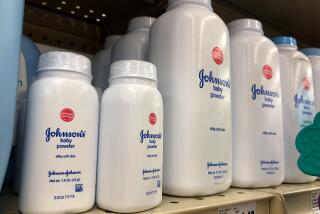Jury Deadlocks in Cancer-Tobacco Case
- Share via
LEXINGTON, Miss. — A judge declared a mistrial Friday in a $17-million product liability lawsuit filed against one of the nation’s largest tobacco manufacturing companies on behalf of a two-pack-a-day smoker who died of lung cancer.
Circuit Court Judge Gray Evans dismissed the jury because the 12 panel members reported that they were hopelessly deadlocked on a verdict after 13 hours of deliberation over two days.
The jury began deliberating Thursday after three weeks of testimony in the suit against American Tobacco Co. and one of its Mississippi distributors, New Deal Tobacco and Candy Co.
Precedent-Setting
Wall Street tobacco analysts flew to Lexington to watch the final days of the trial, in anticipation of a verdict that they expected would have strong ramifications for the tobacco industry regardless of the outcome.
The suit was only the third of its kind in the nation to reach the jury stage. It differs from other tobacco liability lawsuits because of Mississippi’s comparative negligence statute, which allows a jury to assess financial damages even if the plaintiff shares some blame for the injury.
Nathan Horton, 50, filed the suit in 1986 after he was diagnosed as having emphysema and lung cancer. Horton contended that he contracted cancer after smoking two packs of unfiltered Pall Mall cigarettes a day for 35 years. He died on Jan. 27, 1987, and the suit was pursued by his wife, Ella.
The suit maintained that theReidsville, N.C., tobacco company was at least partly to blame for his lung cancer because it knowingly distributed cigarettes contaminated by pesticides and other additives.
Other Point of View
Company attorneys contended that Horton was well aware of the health risks associated with cigarette smoking and freely chose to smoke.
Richard Dynard, director of the Boston-based Tobacco Products Liability Project, said a ruling favoring the Horton family could unleash an avalanche of cases against the tobacco industry and dramatically change the way it does business.
Dynard said the reason more cases have not reached the trial stage is because attorneys are taking a wait-and-see-attitude, waiting for someone to win.
“I think if the plaintiffs win, you’ll see a lot more cases filed,” he said. “I think you’ll also see the tobacco industry lose credibility in other areas as well.”
Expert Testimony
In his closing arguments, James Upshaw, lead defense attorney for American Tobacco, charged that medical experts, many of whom testified in Horton’s behalf free of charge, were zealots on a crusade against the tobacco companies.
“These people are out for a crusade. They are out to make big bucks out of the tobacco industry and the controversy over smoking and health,” Upshaw charged.
Don Barrett of Lexington, one of the Horton family’s attorneys, countered he was “proud to be on a crusade to clean up the tobacco industry.”
More to Read
Inside the business of entertainment
The Wide Shot brings you news, analysis and insights on everything from streaming wars to production — and what it all means for the future.
You may occasionally receive promotional content from the Los Angeles Times.










